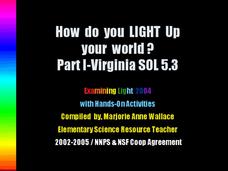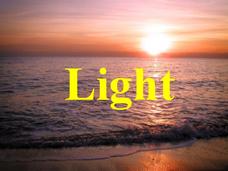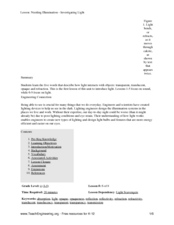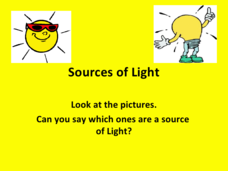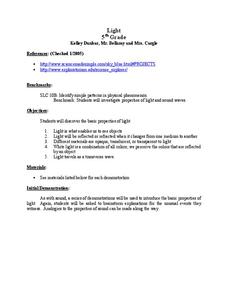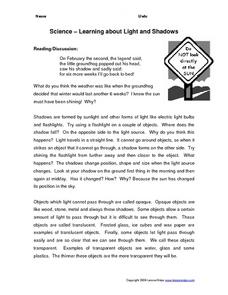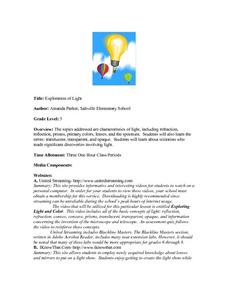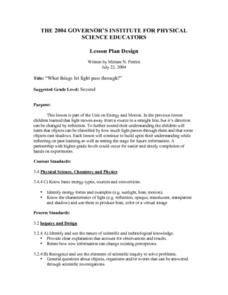Curated OER
How Do You Light Up Your World?
A fabulous presentation on light is here for you. In it, learners view slides which cover many important concepts of light. They understand exactly what light is, what the main sources of light are, what opaque, transparent, and...
Curated OER
Light - Stop Faking It!
This well-designed presentation covers many important aspects of the science behind light. In it, pupils view slides that have a lot of the important vocabulary associated with science, slides of famous scientists who made important...
Curated OER
Shadows & Light, Science & Puppetry
Lights, shadows, action, and inquiry await your artistic scientists. They explore the way light travels, absorbs, reflects, and transmits through shadow play. They create folktale-inspired shadow puppets, explore the science of light,...
Curated OER
Properties of Matter: Translucency
Build up that scientific vocabulary with three super great words that help describe the properties of matter. Transparent, translucent, and opaque are defined alongside concrete examples and critical-thinking questions. Learners are...
Curated OER
Can You See the Light?
Students investigate the transmission of light energy. In this light energy lesson, students observe bubbles using different colored filters and record their observations. They also look at a light source through various materials and...
Curated OER
Light
Light is such a fascinating subject. This instructional activity does a great job of illuminating the mysteries of light for your young scientists. A series of demonstrations which are explained in the plan should help your charges to...
Curated OER
Light
Here is a stellar slide show for illuminating middle schoolers' minds on the topic of light! An interactive slide allows viewers to sort light sources by whether or not they are man-made. More objects are displayed and learners discover...
Curated OER
Investigating Light
Learners study concepts associated with light. In this light lesson, students observe an demonstration by the teacher. They examine reflection and refraction of light and name things that reflect light and those that refract it. They...
Curated OER
Energy: Light -- Spinning Color Wheel
Second graders make spinning color wheels to determine how energy effects what colors look like. They paint or color a color wheel with the seven colors of the spectrum. Next, the spin the wheel to determine what happens. In order to...
Curated OER
Amounts of Light Passing Through Objects
In this science activity, students identify object around them and determine whether they are transparent, translucent or opaque. Students record their findings in the appropriate circle on the activity.
Curated OER
Sources of Light
In pairs, learners will consider and discuss each of the provided slides to determine which objects are a source of light. Items include, but are not limited to, lamps, windows, pencils, mirrors, and the sun; these items are great for...
Curated OER
Materials - Who Wants to Be a Millionaire?
Play a game to review characteristics of different materials. Players will compare natural to man-made materials and how much light passes through them. They consider water and heat resistance as well. If you are preparing your class for...
Curated OER
Light and Shadows
Students explore shadows. In this shadow and light lesson, students predict what will happen to a shadow when the light source is dimmed. Students participate in a whiteboard interactive lesson.
Curated OER
Visual Opacity
Students research and create a slide show in order to classify clouds as transparent, translucent, or opaque.
Curated OER
Properties of Light
In this light waves worksheet, students will measure the wavelength of different light waves and then calculate its frequency. This worksheet has 9 short answer questions and 10 fill in the blank questions.
Curated OER
Light
Fifth graders sit in their seats with the lights on and then the teacher turns off the lights. After their eyes have adjusted, they vote on what colors of construction paper are being held up. The lights are then turned back on and...
Curated OER
No Shadow of Doubt
Fifth graders must use a pencil to draw in the shadows they think will be formed by a house, a greenhouse, and a tree. The sun is behind each of these objects, and an open field is in front of them. That's where pupils draw their...
PBS
Cloud Clues
It's cloudy with a good chance of learning! An inquiry-based lesson begins with an exploration of transparent, translucent, and opaque materials. Young scientists then connect their learning to the different cloud types as they take the...
Curated OER
Science--Learning About Light and Shadows
In this light and shadows activity, students find 5 transparent items and 5 opaque items from the classroom and categorize them underneath their appropriate headings. Students look at 4 boxes with shadows and draw a little sun to show...
Curated OER
Exploration of Light
Fifth graders observe the video, Exploring Light and Color. They access a website to create their own light show. They conduct lab experiments to investigate refraction, reflection,and other light-related topics.
Curated OER
What things let Light Pass Through?
Second graders classify objects according to how well light can pass through them and predict how well objects will transmit light. They experiment with objects to verify predictions while collecting, recording, and interpreting data...
Curated OER
Light Is Amazing
Students investigate light and its energy. They discuss the properties of light, research how much light the moon absorbed on their birthday on a website, complete a graphic organizer, and create a kaleidoscope.
Teach Engineering
All Fats Are Not Created Equal
Apply robotics to connect physical properties to chemical properties. Future engineers use robots to determine the melting points of various fats and oils. The robots can do this by measuring the translucency of the fats as they heat up.
Curated OER
Cloud Shadows
Students classify the visual opacity of various materials, what is needed to create shadows, and classify clouds by the types of shadows that they produce.


